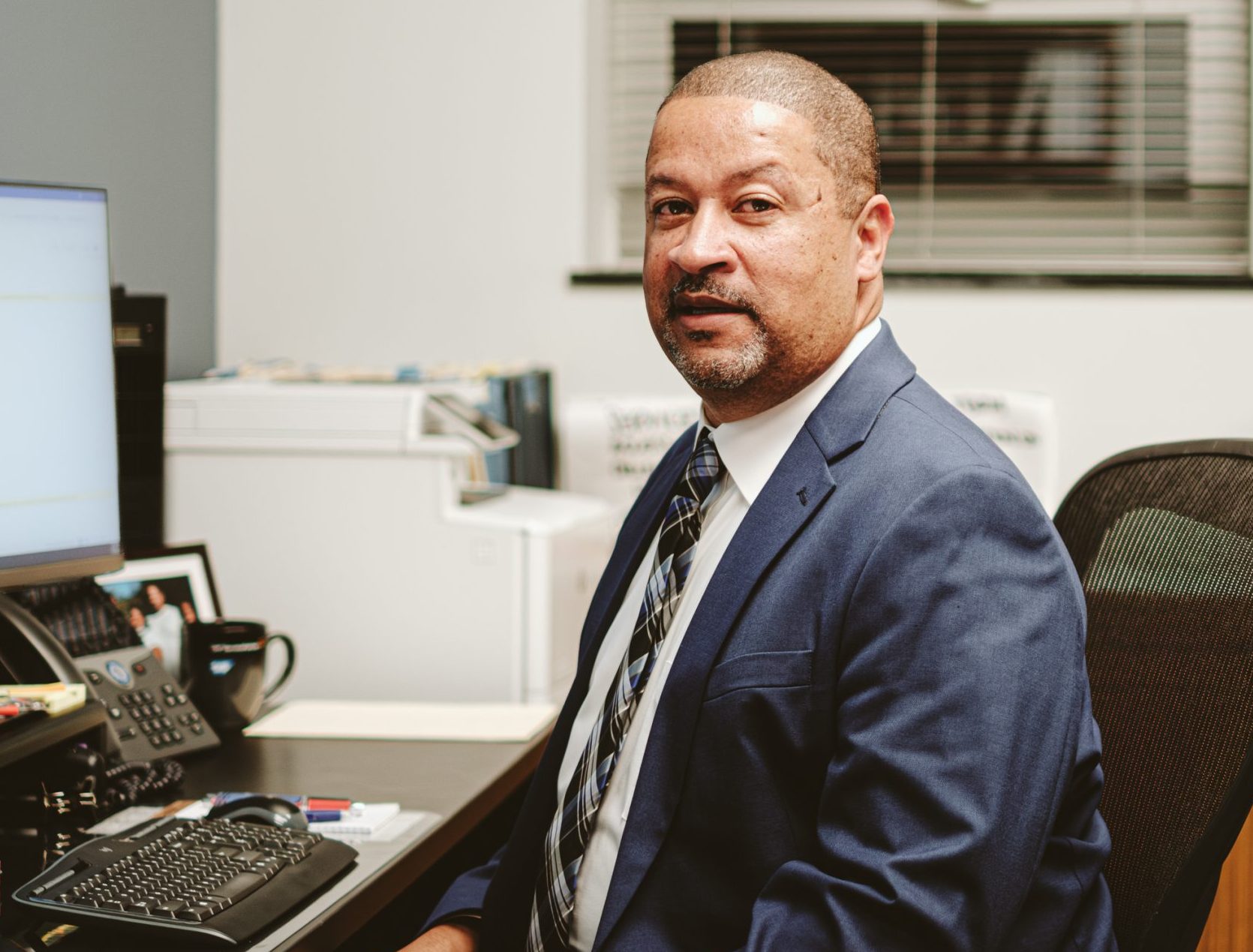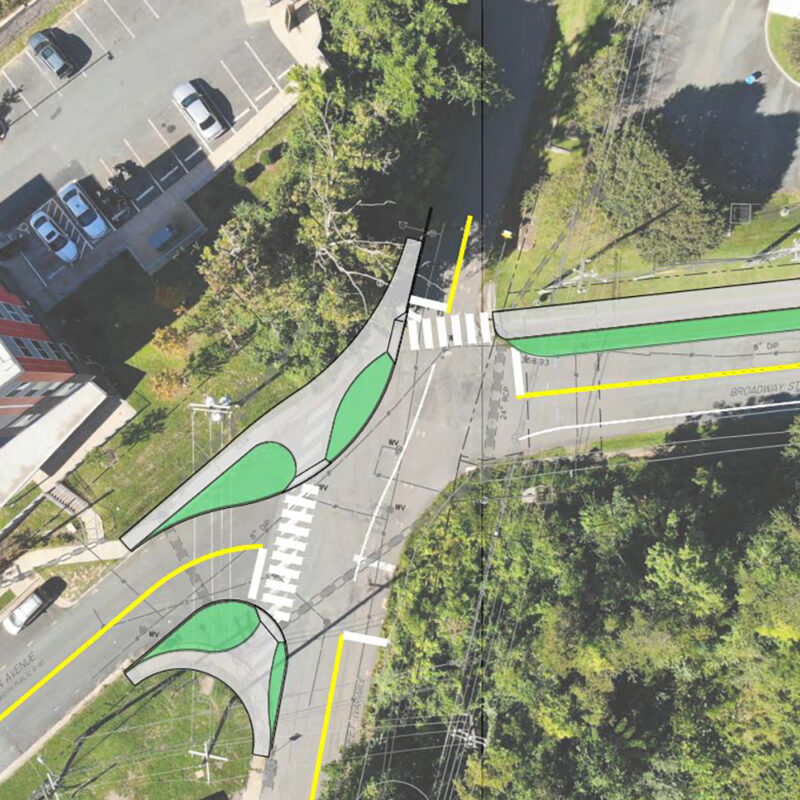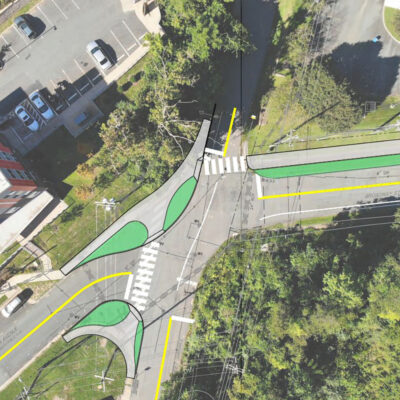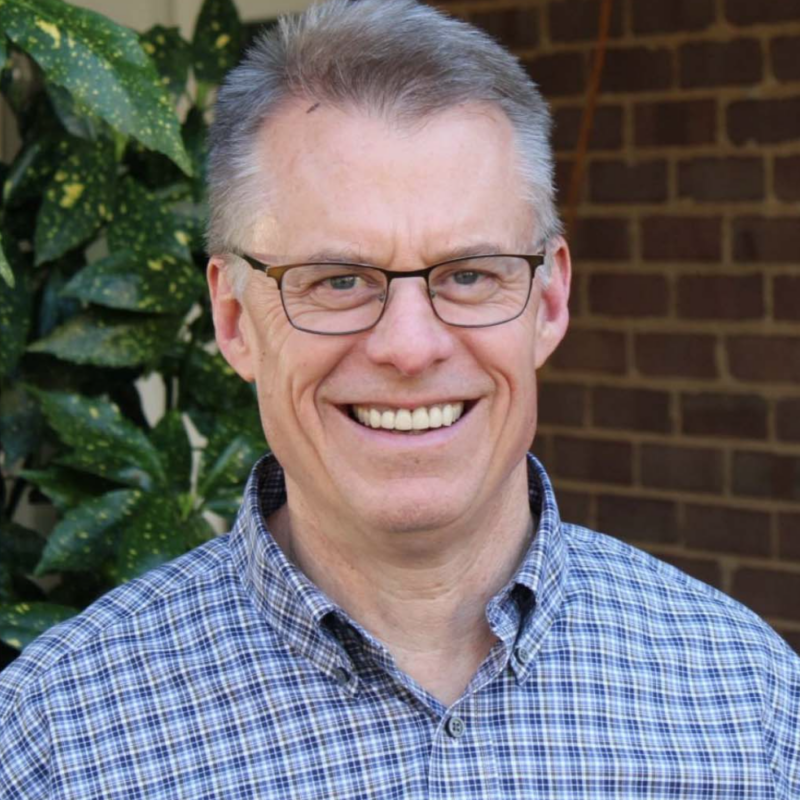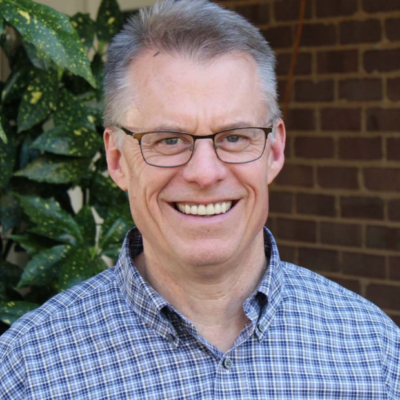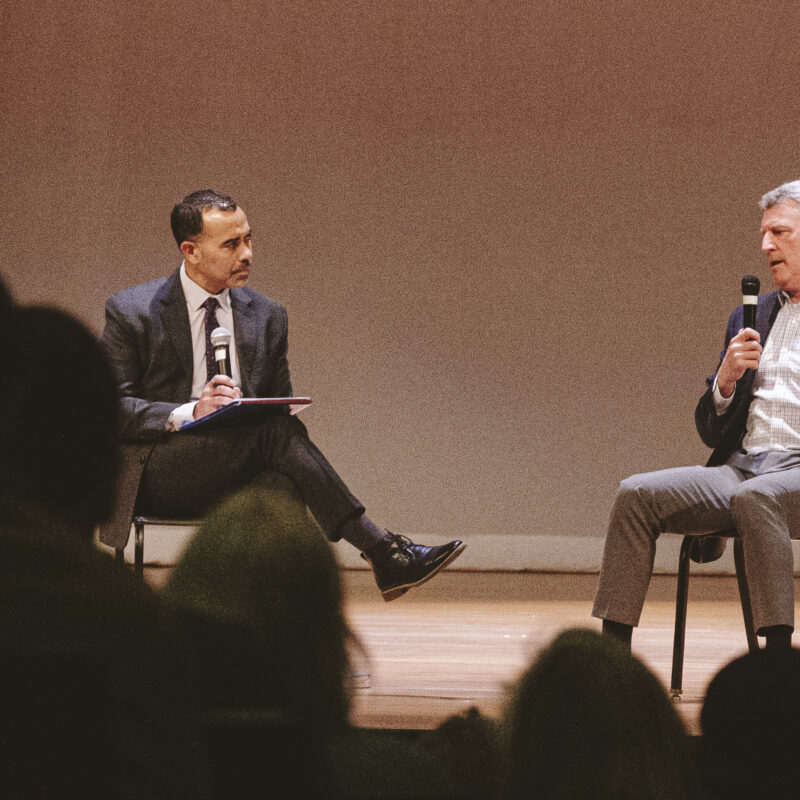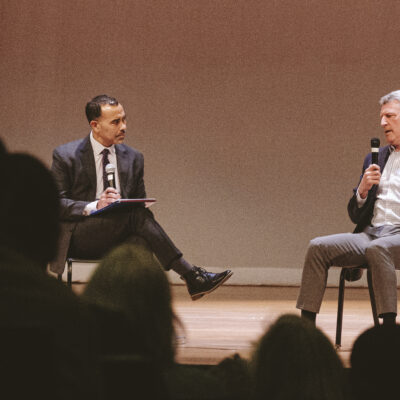After an action-filled first 90 days on the job, City Manager Sam Sanders took an hour out of his (very!) busy schedule to talk with C-VILLE about a wide range of topics, including his new gig’s biggest challenges, staying calm under pressure, and making government boring again.
Sanders came to Charlottesville in July 2021 to be the deputy city manager of operations, after serving as executive director of the nonprofit Mid City Redevelopment Alliance in Baton Rouge, Louisiana. The son of a Marine, he moved countless times growing up, and after his parents divorced, he bounced between his father, mother, and grandmother’s houses. Sanders eventually landed in Newport News, Virginia, where he graduated from Christopher Newport University, earning a degree in English with a focus on journalism.
In his limited personal time, he enjoys watching movies with his family and exploring the outdoors. Sanders’ two adult children live across the country, and his wife is a professor at Virginia State University.
This interview has been edited for length and clarity.
C-VILLE Weekly: You said you originally wanted to be a war correspondent, then you ended up in nonprofits. You were interested in public relations in the middle there. What has the transition into working in government been like?
Sam Sanders: It does feel like war at times. That’s funny. The transition has been smooth in that, because I was here for two years [as deputy city manager], I already had a good lay of the land for some of the key individuals here in town, some of the various issues that have been kind of our hot-button issues, knowing kind of who comes and goes normally, what are they usually calling and talking about. That has been helpful.
I really formed my own relationships with as many people as I could in that deputy role. So a lot of the people that I still talk with today, I was talking with them before. So that part was easy. Coming here, I knew what it meant to do the deputy role, because I was basically in charge of the services that really impacted people on a daily basis. So I knew that meant I couldn’t just sit at my desk, I needed to be out in the community meeting people as well. Which is what I did. … I didn’t get out as much as I probably wish I could have, because there were just so many things going on. But I got out and met those folks in that old role. And that’s probably going to pay me well in this, in that I’m not making brand new relationships to be able to do the job. But coming from Baton Rouge, I was looking for a new adventure, I was looking for a new challenge. I had been in that job for 15 years, and it was an amazing opportunity. But I had probably stayed a little bit longer than I needed to. It was time to pass the baton to someone else.
What is your job like on a day-to-day or week-to-week basis?
It is madness. Not madness in a bad sense, madness in that it’s a lot. It just is. The job in itself, a normal version of a city manager job is always a lot. That I knew, that I have kind of studied on my own as I’ve tried to wrap my arms around this form of government because I didn’t come from this form of government. We had a strong mayor and council had a bigger role to play [in Baton Rouge]. So it’s been interesting. Even sitting in the deputy seat, I thought I understood. It wasn’t until I sat in this seat that I really understood. Because there are a lot more meetings, a lot more things that I’m responsible for being a part of as the city manager. I sit on the Rivanna boards, and I sit on the airport board. So those are things that you don’t just walk into that meeting and everything is okay. There’s more stuff to read, there’s more stuff to understand. I am charting the direction of each of those and the votes that I cast in those meetings, very similar to how I’m preparing council to be able to vote on their matters in a council meeting. So there’s a lot to juggle … it’s what I signed up for. Most of it is just being able to get the time.
What has been the largest challenge that you’ve encountered in your time as city manager?
Well, I would say that the recent events at Market Street Park were probably the toughest period in this—well, I hit 90 days on Wednesday [November 1]. It’s probably been the most difficult period because I think we as a community at large know that we should prioritize individuals experiencing homelessness, and do everything we can to reduce the impacts of that, and how that plays out. … The challenge of it is that we’re not all on the same page, we’re not all more or less willing to adapt to one agenda so that we can really accomplish what we probably could accomplish. And I say that because … we could do something significant here. A city this size with the resources that we have, even with the scope of the problem that we have, I believe we can make a difference in a way that other communities, other peer communities, would not because they wouldn’t necessarily make the decisions that I think we are willing to make.
Part of my task right now is to try to help get people to that same place and focus on what … would make a difference for those that are unhoused. And for me, the number one priority today is that we need to have an operational shelter 24/7, 365 days a year. That is a minimum. It is not the finish line by any means, it’s probably not even half of the race. But I think it’s important for us to recognize that we should provide an alternative for those who are willing to come from outside, a place that they find safe and comfortable. And it can’t be a place that they have a short tenure in if it’s going to take us a minute to get them out of it and to get them on the ladder to self-sufficiency so that they can then handle things with the various supports attached. So I think that’s probably been the toughest period only because I knew it was on the list of things that I would have to tackle. I did not realize it would come so early. … I would have preferred to have been able to do a few more things to get a little more clarity before I actually started to work on it. But that’s what this job is: You don’t get to plan how it comes at you. And it just means that it became a thing for me to focus on, an important thing for me to focus on, and one that I haven’t stopped working on. I’m still working on it today, I will continue to work on it. And even though I’ve developed a work group that’s internal, that’s going to keep working on it, in the broader sense, I still have a few tasks that I’m working on personally.
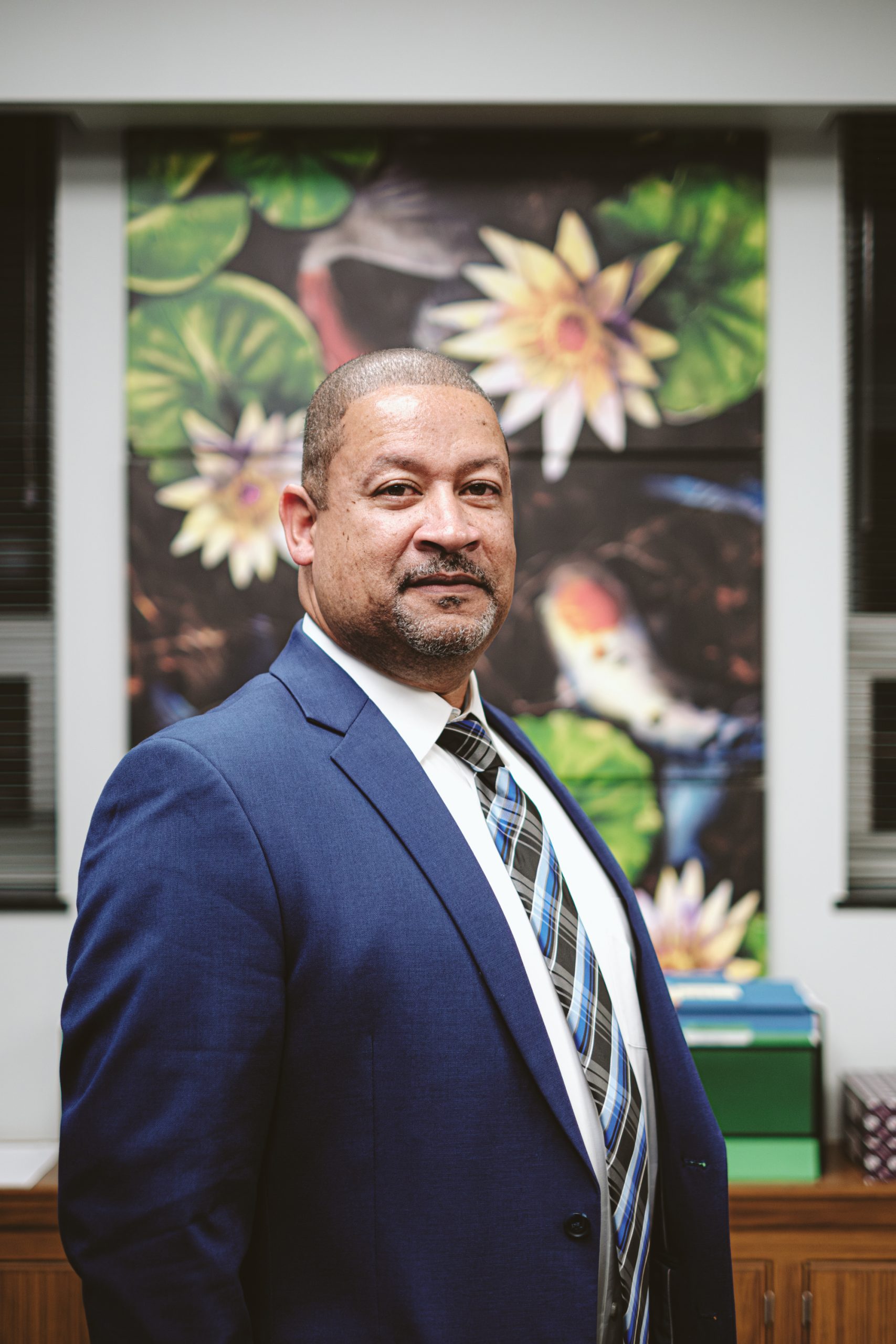
At a recent City Council meeting, you presented that workgroup and short-term, medium-term, long-term priorities for addressing homelessness in Charlottesville and in the surrounding areas. Now that PACEM is open, what are your immediate next steps and the workgroup’s next steps?
They’re separate, so there’s a lot. So the workgroup itself [is] internally building a data set, they’re trying to pull the information together that is available. They’re trying to ask questions of, “What do we not know? … Are there things that we don’t know? Are there things that we need to know?” When we talk about having a shelter, first question is, how big of a shelter? I don’t know that answer yet. We’re going to have them do that work and continue to figure those things out. And one other thing they’re going to prioritize is direct contact with the unhoused, so that we can get clarity from those who are experiencing it; [they] are best for telling us how we do something about it. So we want to get that feedback as well. … I created a lane for myself. And that’s the way I described it to them. Y’all have the highway, I have a lane, I’m gonna work on … building an opportunity for us to have a relationship with the county on this matter. I would love for it to be a regional engagement. But I don’t know that all of our regional partners are going to be willing to come to the table. But I intend to ask.
I think the best thing that I could do is pose the question, I don’t believe it’s been posed to them before, from what I understand, so I don’t have a problem with bringing that to the table. And we’re beginning to set up a meeting for us to have a regional engagement. So hopefully, something will come out of that. If it doesn’t, then I’m hoping at least Albemarle County would join me in that because we’ve had some basic conversations, but there’s still some work that they need to do. I am trying to make sure that Premier Circle stays on track. There’s a budget gap that I’m actively working to try to close, in partnership with others. And I’ve been meeting with Virginia Supportive Housing on that matter. And there’s even a chance that we might temporarily reopen Premier Circle for a short while, just to ensure that we have an option for everyone. Because that was what I wanted to prioritize … that we had the temporary lifting of the operating hours. It was to make sure that I could do what I could do to find out what other options existed. … And then, there’s still more that’ll probably begin to fall into my lane. But for right now, those are three big heavy lifts. But I think we’ll bring a lot more information to the table. And then what I’ve said to council is there will be plenty of opportunities for this city to invest in solving problems associated with homelessness.
You faced pushback during the time that Market Street Park’s curfew was lifted. There was a wide swath of emails sent to you and city councilors. What was it like receiving those messages? How did that impact you? And were you able to take any of the input or feedback that you got and turn it into something constructive?
It’s hard when people come attacking you. It’s hard when people come very negative. And yeah, there were some times where I was angry with what people chose to say to me about whatever. Criticism comes with [the] territory. I know who I am, so I don’t take it personally. But it doesn’t mean that I’m not human and I do get mad.
The presentation of my work plan and strategy on the second of October is an example of me being mad because I felt like I had to get some things off my chest so that I could process in a healthy way. It was disappointing at times, because I heard people who told me not to prioritize the unhoused individuals in the park. And I found that very hard to accept. I am a caring person, I am not one who just simply gives, gives, gives and does not expect that people do anything, I’m not that person. I’ve seen too much of the struggle in life for those who haven’t had, but yet, they still found a way to do things and they were able to change their own trajectory. And I want to be a part of that as much as I can. But I’m also willing to reach down and lift up someone who cannot get up on their own, and do whatever needs to be done. So to hear I shouldn’t focus on them was a little hard to accept and appreciate. Because if I don’t, then who will? I mean that just as a very simple statement, and a very basic concept there. And I was not really inclined to spend a whole lot of time thinking about anyone who said that to me. … I welcomed every chance that I got to see something else about someone else thinking about it in a different way. Because I don’t know everything. And I don’t pretend to know everything. But yeah, it’s hard when “give us our park back”—well, the park belongs to everyone. And I found myself defending the right for anyone else to be in the park.
There are three parks downtown. So options exist. … I did a lot of—stay cool. Don’t go there and do that. Because people are angry, they’re angry for different reasons. It’s not for me to try to make them not be angry, it’s for them to worry about it. But for me, I just wanted to make sure that I was doing what I thought was right. I will always strive to do what I think is right. And I will trust that when I do it, I’m doing it for the right reason. So anything that I do in this job, I’m going to always try to look at it that way. … And the moment that I gave those individuals was an opportunity to know that they could be there and it was okay to be there. And then, temporarily, we would allow that while we figured out some other things, and then there will be an alternative. And for those that chose not to go there, I am still thinking about them. I’m still working towards a resolution for them. And I will continue to do so.
Has your inbox calmed down a bit?
What I see is, things come in cycles. That kind of went away. I think a lot of people, when they heard me reinstate the operating hours, they were angry about that. So of course I had another wave of emails that came, “How dare you do that, you really shouldn’t do this, you shouldn’t do that.” And I said it was temporary, I did not hesitate when I said that in the beginning, I always felt that that’s what it was. This was not about hurting anyone. I recognize that people had opinions about what the park had become. But I also recognize that in the meantime, I have been working to secure additional beds for shelter services and to bring them online earlier than normal. And we did that. … I thought I was doing what I thought was right. And I continue to hold to that. I think we planned the best transition that I could have ever dreamed. I was worried that evening thinking that something was gonna go wrong. … But I think that the various people who worked in the park throughout the week, we know that some of the case managers were there on a regular basis, talking and offering options and trying to find out what people needed and what they were going to do. Our police chief did a great job, in my opinion, of demonstrating that he was serious about wanting to help make the transition go smoothly. And we were able to accomplish that. So, I’m not celebrating it in the way that some people think that I might have. I believe they probably think I’m running around the office doing a high five. That’s not me. I did not do that, because people are still homeless. And that is not a reason for me to high five anyone.
You mentioned earlier, and I believe it was at the press conference where you first accepted the position, before you even officially started the job, that you would like to make government boring again. Where do you think you are in that process? And is that still something you’re aiming for?
People have questioned me on what does that mean, and they’ve said it in a negative light. So I want to clear that up. And I would love for you to print this. So when I mentioned boring, I meant boring in the sense of what it feels like inside the organization. That when we come to work, we actually can plan to sit down at our desks and do the work that we need to do. Not be bombarded with many, many different distractions and things that don’t necessarily get us to helping people, serving people, solving problems. It’s the many, many things, the distractions, the things that take you off your course. That’s what we mean when we reference boring government. It is not what people have sometimes thought that means, that it’s safe, and you’re not really trying to do anything special, you live in the status quo. I am not a status quo individual. … It’s meant to be the ability to come in and do the work. And you want to come in and do the work with the right perspective.
But boring government means that you come in and you punch a clock and you get work done in the course of that day. And it’s a predictable enough day that you can anticipate what you’re going to be dealing with, you’re going to get those things done, and you’re going to actually move the needle to this place, and you’ll come back and you’ll do it again and you’ll do it again and you’ll do it again. That’s really what is meant by boring, it is not in any way an indication that we don’t want criticisms or questions or challenges or anything like that.
In the national media, the international media, the mention of our city’s name has become a shorthand for the events of August 12, 2017. How have you grappled with that? How do you think about that in your role as city manager?
Well, so as the city manager, of course, along with council, I am a champion of this city. And it is my responsibility to make sure that I bring positive attention to it at all times. So that gets me in trouble at times, because I’m going to say that Charlottesville is a beautiful place, when it is. But it’s a place that has challenges just like anywhere else. And there is a long history here. So even though the recent history is what people think about and talk about, there’s a rich history, a rich, complicated history, that goes back to its founding. And that in itself has caused people to feel various things. And I don’t know that we have necessarily reconciled all of that. I think we’ve touched on it at times, and maybe talked about it here or there. And eventually, I think we probably could find a way to get there, some consistency. And this work that I’m in might actually lend itself to being able to see how I might be in that conversation.
I do think that one day, I’m going to be able to mention to someone that I am from Charlottesville, Virginia, and they’re not going to basically cringe or “Oh…”—that kind of reaction. Because I have gotten that reaction. … I don’t want that. … I don’t think that event is what this city is all about. Do we have real issues here? Absolutely, we do. … I’m from the South. I was born in Tuscaloosa, Alabama, I lived in different parts of the state, lived in Louisiana, but I also lived in South Carolina, California, and Hawaii. And I knew racism everywhere that I went. I understood what it felt like in many places. I knew exactly what it looked like. And it was real. So being here where it is discussed a lot is different for me. But I recognize that means there’s more to it, and I can’t dismiss it.
What are your hopes for Charlottesville?
I do hear people at times say that Charlottesville doesn’t know what it wants to be. I think that’s an important question. What is it that Charlottesville wants to be? I think we need to make sure that we are thinking about the answer to that question. Because that would be what I would want to be working on. Council just created a new vision that says, “A place where everyone thrives.” That says a lot, that means a lot. I think I need to make sure that we are doing everything that we can to ensure that we can live up to that one day. … Tell me where you want to go, and I’ll lay that path and we will get there. And I think that’s what the team that is the city organization should really be focused on, is that, “How do we get the city where we want it to be?”
